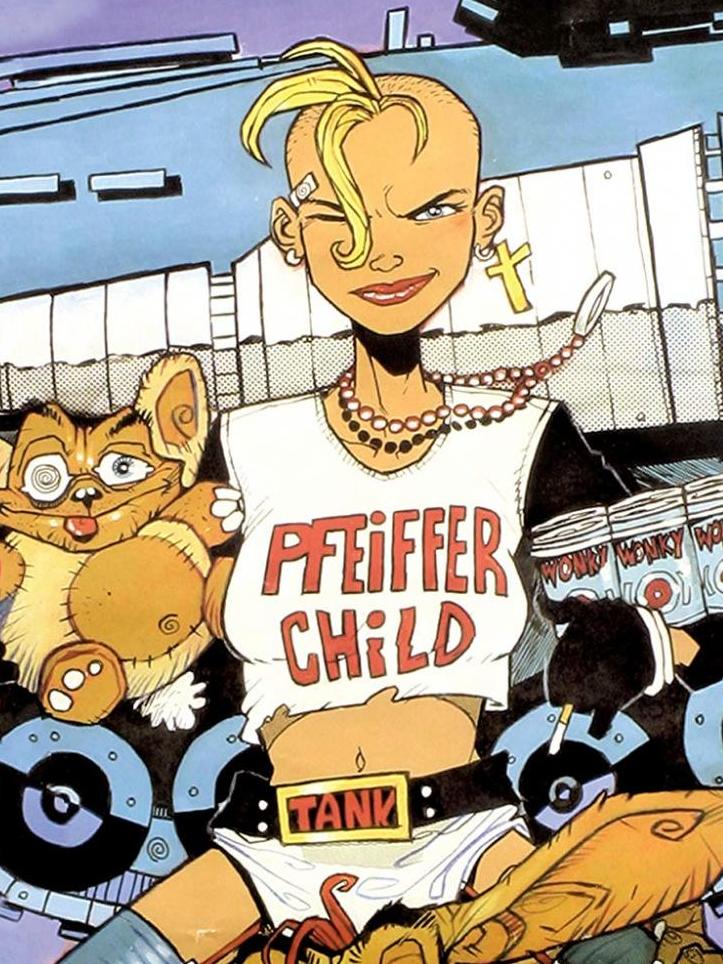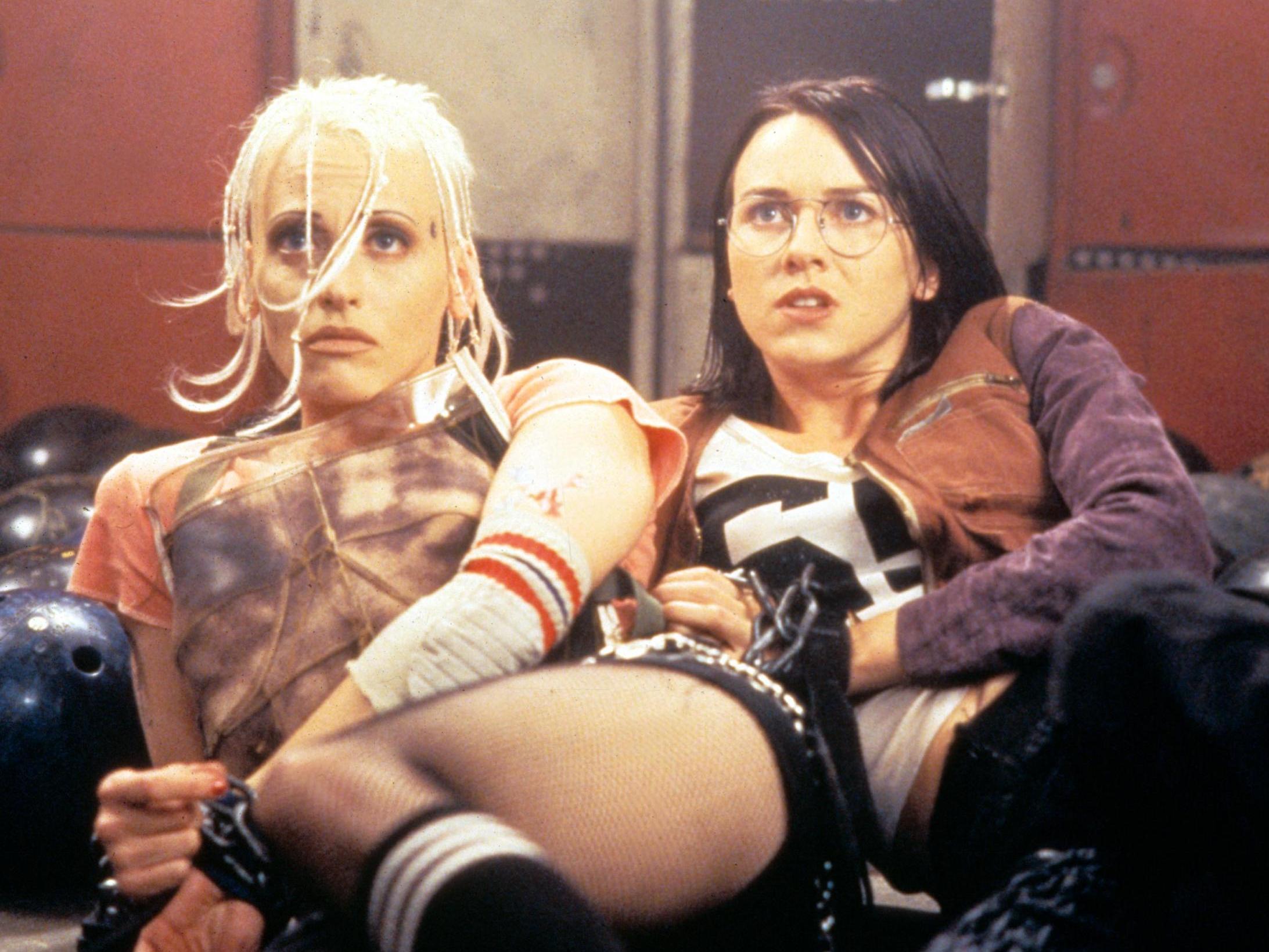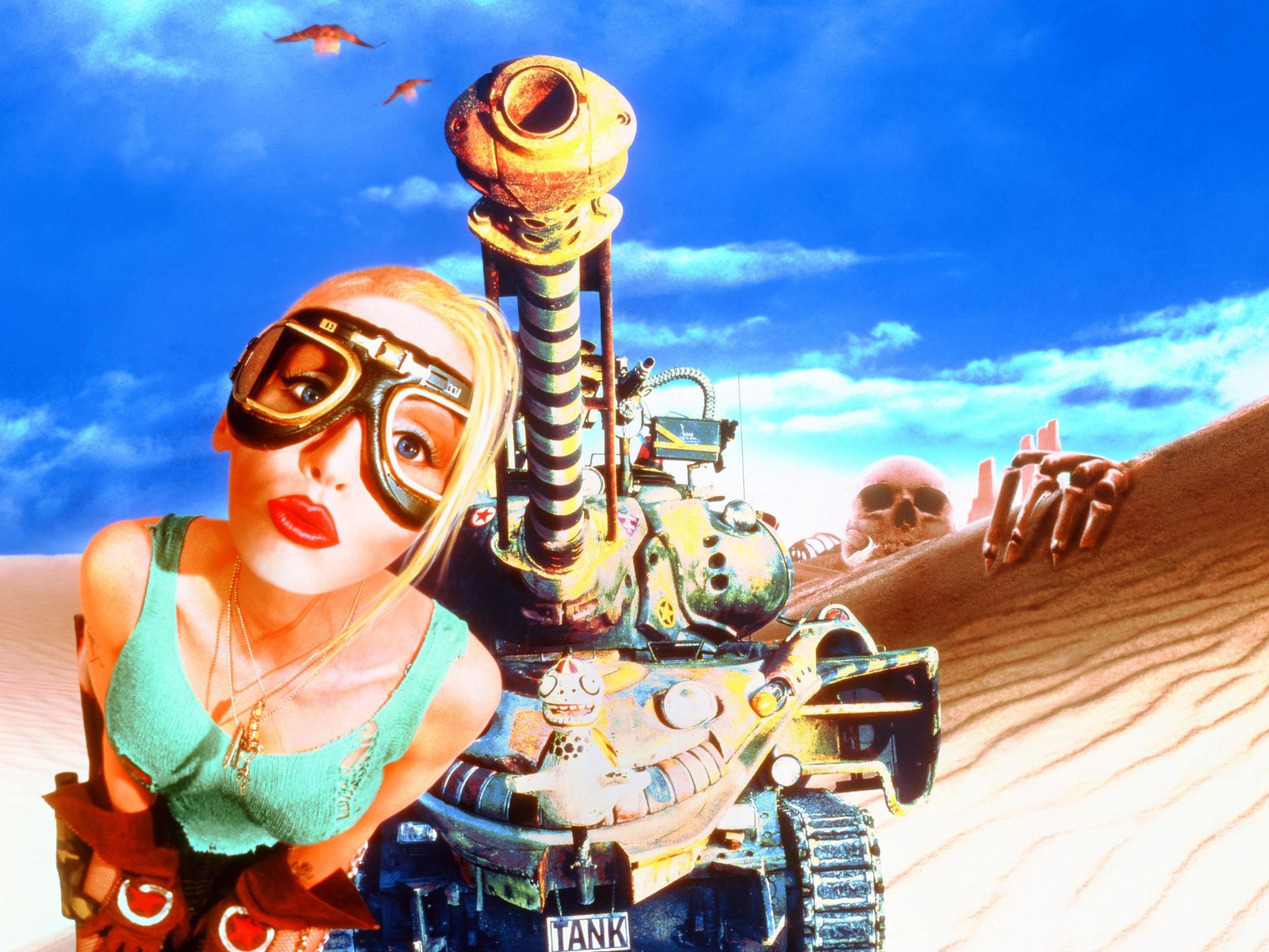
Twenty-five years ago, a woman who looked like Gwen Stefani and talked like Tommy Pickles proved that incredibly annoying people could be superheroes, too. Tank Girl, a Hollywood adaptation of Jamie Hewlett and Alan Martin’s UK comic book, was a critical and commercial failure. The same industry figures who wanted it made were also somewhat baffled by it, in the process neutering an underground superhero beloved by punks and weirdos. Tank Girl’s fans – expecting anarchy, dildos and sex with mutant kangaroos – revolted.
Directed by Rachel Talalay and starring Lori Petty and a pre-fame Naomi Watts, Tank Girl is the worst Tank Girl adaptation imaginable. Viewed separately from its source material, though, it’s one of the strangest and largely misunderstood films of the Nineties – a garish vision made within the studio system and bursting with surreal, if obviously reined-in, flare.
Tank Girl is set in the post-apocalyptic Australian outback, with the world’s dwindling water supply controlled by Malcolm McDowell’s dastardly Kesslee. Living on a commune is the squawking, smart-ass Rebecca Buck (Petty), a girl who loves tanks and doing a whole lot of nothing. After a raid on her home, Rebecca is abducted and tortured by Kesslee and forced into doing the bidding of his corporation, known as Water & Power. Fleeing imprisonment, Rebecca joins forces with an army of human-kangaroo hybrids led by rapper Ice-T, and the introverted Jet Girl (Watts), to wage war against them.
The film is Mad Max by way of a Vivienne Westwood fashion show, broken up with musical numbers and interspecies love affairs. Nothing else like it exists – with only the recent Birds of Prey sharing some of its manic, exhausting charm. It makes a kind of sense, then, that Margot Robbie’s production company recently acquired Tank Girl’s film rights, since the character is very much Harley Quinn 1.0. Today, studios also have more respect for the comic book stories they’re adapting, recognising the financial dangers of alienating a core fanbase. Back in 1995, United Artists had no such concerns.
If modern comic book adaptations regularly cannibalise one another, all guided by the same blueprints, Nineties superhero movies were strikingly singular. In hindsight, much of the decade’s releases were smorgasbords of striking ambition. Tim Burton’s Batman movies were psychosexual funhouse rides, Joel Schumacher’s Batman movies homoerotic and maximalist. The Crow (1994) and Blade (1998) played like night-time raves, full of leather and volatility. Steel (1997) cast basketball legend Shaquille O’Neal as a costumed vigilante, because why the hell not?
Tank Girl slots right in there. It often exhibits a wonderful, freewheeling quality, full of nonsense detours and fantasy. Rebecca breaks into a Cole Porter song; she and Jet Girl evade W&P minions by pretending to be photographers scouting men for a topless calendar; another scene features strippers that look like Austin Powers fembots energetically dancing to Bjork’s “Army of Me”. The film’s soundtrack, it should be said, is aggressively brilliant. Curated by Courtney Love, it plays like a greatest hits record of Nineties grunge and alternative – Veruca Salt, L7, Belly, Portishead and Scott Weiland all get a look in.
The film’s fashion is similarly inspired. There’s a touch of Luc Besson’s The Fifth Element (1997) in its fixation on oranges, silvers and wild silhouettes – even if Tank Girl has received little of that film’s sartorial acclaim. Designed by costumier Arianne Philips and – at least on a couple of pieces – a pre-fame Rick Owens, Petty’s outfits are a mix of hard leather and shiny velvets. She sports thick boots, tiny mini-skirts and jackets decorated in pins. Her hair is spectacularly silver-white, alternately shaved or at least hacked to pieces.

The only problem with any of this – and it was a fundamental one for Tank Girl’s original fanbase – is that it isn’t really Tank Girl. Hewlett and Martin’s original stories, published in Deadline magazine and then later her own series, were shaped by Eighties punk culture. They burn with bratty, sex-positive antagonism, Tank Girl herself a lazy, potty-mouthed and perpetually inebriated outlaw. She drinks, tokes, burps and farts, loves sex, and a key element of her origin story involves the prime minister of Australia defecating his pants because she hadn’t delivered his personal colostomy bags in time. The stories themselves are often deliberately nonsensical, too, marked by their tendency to break the fourth wall and fly off on obscure tangents.
For this reason, Tank Girl found fans among punks, riot grrls, queer women and ravers. She became a comic figurehead for counterculture in the wake of Margaret Thatcher, as much a symbol of female rebellion as she was one of social upheaval and rejection of restrictive standards. It’s no wonder, in an age of MTV, Nirvana and Reality Bites, that Hollywood saw it as ripe for adaptation. It’s also no surprise that it wanted to pilfer its “edgy” aesthetics rather than any of its actual messaging.
Frustratingly, Talalay was caught in the crossfire. “When I made Tank Girl, I truly believed that I would break the glass ceiling,” she told Vice in 2017. “I just thought, ‘I believe in this comic. It’s so out there, it’s so outrageous, it’s so punk, it’s so me.’ I said, ‘This is my shot, and I’m going to go all out there, and you’re either going to love it or you’re going to hate it.’ I didn’t care if it averaged out as a five, because I wanted it to be a one or a 10.”
A filmmaker with an eye for the camp and surreal (John Waters served as a mentor and friend in her early career), Talalay has only just directed her first non-TV movie since Tank Girl. She’s also always said that the film’s problem areas stemmed from backers who had no idea what Tank Girl was. It explains why the resulting film, apparently taken out of her hands by the studio prior to release, sometimes seems unsure whether to fully give in to the theatrical and the absurd.

References to Rebecca’s sex life were cut from the film, as were the sex toys that Talalay originally had decorating the set. Her relationship with Booga, the mutant kangaroo she dates in the comic books, is also weirdly desexualised in the film, despite the production spending thousands of dollars on a prosthetic kangaroo penis during shooting.
“Sometimes the guys are threatened by it – the older agents,” Talalay told Wired in 1994, shortly before production began. “Like, ‘What is this? Why are the only good guys in the script mutant kangaroos?’ ‘Yeah,’ I go, ‘isn’t that cool?’”
Hewlett and Martin have always spoken of their disappointment with the film. The pair sold the Tank Girl rights purely to make real money from the property, Deadline never being an enormous seller, but were largely excised from the development process. Despite working with Talalay in its early stages, Hewlett and fellow artist Philip Bond were only asked to significantly assist after production had been completed – namely by drawing animated panels to explain plot points that otherwise made no sense, and to fill in scenes that went un-filmed.
“They realised that it really didn’t look anything like the original comic and then they pulled in Jamie and Philip to pad it out with comic panels,” Martin recalled to Sci-Fi Online in 2002. “Up until that point, we’d kind of hoped that they knew what they were doing. They made a lot of noise as though they did know what they were doing, but when it came down to it, it didn’t look that way.”
Speaking to Vice in 2017, Hewlett elaborated further. “They played that game of looking for things that are cool, buying those things and then turning them into something else,” he said. “Which is what Hollywood does. If they were to stick to the actual storyline of the original idea of Tank Girl, then you’d probably have an X-rated movie on your hands, and what they want is a family movie they can open and have a big box office weekend with.”

Ultimately, Tank Girl was neither. On a budget of $25m, it grossed just $6m worldwide. Fans of the comic books were unhappy with the changes made to their heroine, and non-fans weren’t convinced to show up in the first place. There wasn’t another significant female-led superhero movie until 2004’s Catwoman, starring Halle Berry, and we all know how that went. Before she directed the game-changing Wonder Woman in 2017, director Patty Jenkins quit Thor: The Dark World. When she recently revealed the reason for leaving – because she didn’t like the script, and couldn’t risk the optics of a woman directing a badly written superhero movie – it was hard not to think of what Talalay went through.
As an adaptation of a beloved comic book figure, Tank Girl is something of a disaster – obviously cut to ribbons, almost embarrassed by its own gonzo origins and largely mishandling what made the source material so compelling. But taken at face value, it’s sheer fun – a film that’s aware of its own silliness and doesn’t particularly care if you find it annoying.
As played by the helium-voiced Petty, Rebecca is snarky, flamboyant and something of a nightmare, like a live-action Betty Boop relentlessly deploying brainless one-liners. There is no faux-intensity in her, no struggle to be “likeable”. You could imagine, if Talalay weren’t hamstrung by studio executives, this could have won over even the most devoted fans of the comic book. In its existing form, Talalay’s Tank Girl is a train wreck, but oh what a glorious one.







